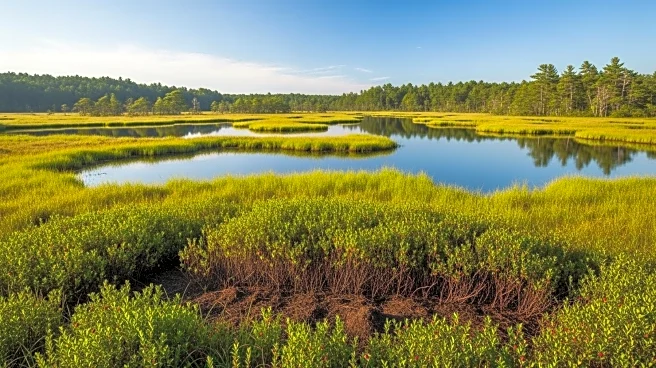What's Happening?
Cranberry farmers in Massachusetts are increasingly restoring their bogs to native wetlands due to economic pressures and climate change. Massachusetts, historically a major cranberry producer, has seen a decline in production as farmers face lower prices and unpredictable weather conditions. The state, once the leader in cranberry production, has been surpassed by Wisconsin, which now produces the majority of cranberries in the U.S. Massachusetts farmers are retiring their bogs, opting for conservation efforts supported by federal, state, and local funding. This shift is driven by the desire to preserve the land and the availability of financial incentives for restoration projects.
Why It's Important?
The restoration of cranberry bogs to wetlands reflects broader environmental and economic trends affecting agriculture. As climate change impacts traditional farming practices, farmers are seeking sustainable alternatives. The move towards conservation highlights the growing importance of environmental preservation in agricultural policy. This shift may influence other states and industries facing similar challenges, promoting sustainable land management practices. Additionally, the decline in cranberry production could affect market dynamics, impacting prices and availability of cranberries for consumers and related industries.
What's Next?
Massachusetts farmers may continue to explore alternative uses for their land, such as solar farms or housing developments, alongside conservation efforts. The trend towards wetland restoration could expand as more farmers retire and seek sustainable solutions. Policymakers may increase support for conservation initiatives, recognizing their environmental benefits. The cranberry industry may need to adapt to changing production levels and explore new markets or products to maintain profitability. Stakeholders, including environmental groups and government agencies, may collaborate to enhance restoration efforts and support affected farmers.
Beyond the Headlines
The restoration of cranberry bogs to wetlands raises ethical and cultural questions about land use and conservation. It reflects a shift in values towards environmental stewardship and sustainable practices. This trend may influence public perception of agriculture and conservation, encouraging broader societal support for similar initiatives. The cultural significance of cranberries, particularly during Thanksgiving, may evolve as production methods change, impacting traditions and consumer expectations.









